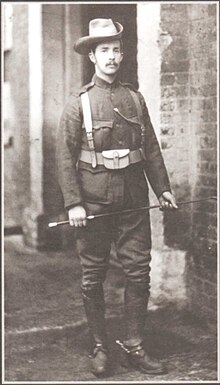Erskine Childers | |
|---|---|
 Childers in uniform of the CIV, 1899 | |
| Teachta Dála | |
| In office May 1921 – June 1922 | |
| Constituency | Kildare–Wicklow |
| Personal details | |
| Born | Robert Erskine Childers 25 June 1870 Mayfair, London, England |
| Died | 24 November 1922 (aged 52) Beggars Bush Barracks, Dublin, Ireland |
| Cause of death | Execution by firing squad |
| Resting place | Glasnevin Cemetery, Dublin |
| Nationality | Irish |
| Political party | Sinn Féin |
| Spouse | |
| Children | 3, including Erskine Hamilton |
| Parent |
|
| Relatives |
|
| Profession |
|
| Known for |
|
Robert Erskine Childers DSC (25 June 1870 – 24 November 1922), usually known as Erskine Childers (/ˈɜːrskɪn ˈtʃɪldərz/[1]), was an English-born Irish nationalist who established himself as a writer with accounts of the Second Boer War, the novel The Riddle of the Sands about German preparations for a sea-borne invasion of England, and proposals for achieving Irish independence.
As a firm believer in the British Empire, Childers served as a volunteer in the army expeditionary force in the Second Boer War in South Africa, but his experiences there began a gradual process of disillusionment with British imperialism. He was adopted as a candidate in British parliamentary elections, standing for the Liberal Party at a time when the party supported a treaty to establish Irish home rule, but he later became an advocate of Irish republicanism and the severance of all ties with Britain. On behalf of the Irish Volunteers, he smuggled guns into Ireland later used against British soldiers in the Easter Rebellion. He had a significant role in the negotiations between Ireland and Britain that culminated in the Anglo-Irish Treaty, but was elected as an anti-Treaty member of the first Irish parliament. He sought an active role in the Irish Civil War (over the acceptance of the terms of the treaty) that followed and was executed by the Irish Free State.
As an author, his most significant work was the novel The Riddle of the Sands, published eleven years before the start of the First World War. Its depiction of a secret German invasion fleet directed against England influenced Winston Churchill, the First Lord of the Admiralty, into strengthening the Home Fleet of the Royal Navy. On the outbreak of the First World War Churchill was instrumental in calling Childers for service in the Royal Navy, for which he was awarded the Distinguished Service Cross.
Childers was the son of British Orientalist scholar Robert Caesar Childers, the father of the fourth president of Ireland Erskine Hamilton Childers, the cousin of British politician Hugh Childers and of Irish nationalist Robert Barton, and the grandfather of the writer and diplomat Erskine Barton Childers and of the former MEP Nessa Childers.
- ^ Olausson & Sangster 2006, p. 71.